
The patient was intubated and put on a ventilator.
A two-year-old patient residing in the mountainous district of Son Ha is being actively treated at the Intensive Care and Anti-Poison Department, Quang Ngai Province Maternity and Pediatrics Hospital. Initially, the patient only had a fever, was fussy, and refused to eat due to hand, foot, and mouth disease. However, when brought to the hospital, the doctor diagnosed that the patient had become seriously ill, with complications including encephalitis and gastritis. The patient was intubated and put on a ventilator. She is now out of danger but is still in a serious condition. Dinh Thi No, a relative of the patient, said that the child had a fever at home for two days, then went to the hospital. The doctor said that the child had encephalitis, hand, foot, and mouth disease, and gastritis.
The current situation of hand, foot and mouth disease is very tense and cannot be ignored. The danger of hand, foot and mouth disease compared to other diseases is that before it becomes serious, it is often in a peaceful stage. Most children have a fever but still play and are alert, which makes it easy for parents to misunderstand. Therefore, it is important to avoid complications when children have hand, foot and mouth disease. Parents must closely monitor their children's health to detect and treat the disease promptly. Doctor Tran Dinh Diep, Head of the Department of Intensive Care - Anti-Poison, Provincial Maternity and Pediatrics Hospital said: "Complications of the disease are similar to encephalitis, respiratory failure, circulatory failure, apnea, cardiac arrest, multiple organ failure. The most important thing about hand, foot and mouth disease is not finding complications but early detection and timely treatment. If it is more serious, early intervention is required."

Doctors warn that hand, foot and mouth disease is complicated this year
Currently, the Department of Tropical Diseases, Provincial Obstetrics and Pediatrics Hospital admits and treats more than 40 children with hand, foot and mouth disease every day. This number has doubled compared to last month. The number of severe patients has also increased significantly, including severe cases of level 2B group 1, 2B group 2 and level 3. Doctors warn that this year's hand, foot and mouth disease is complicated. Currently, many localities have appeared with the EV71 virus strain, which has the characteristic of spreading quickly, causing serious illness in children with hand, foot and mouth disease. Doctor Do Duy Thanh, Department of Tropical Diseases, Provincial Maternity and Pediatrics Hospital shared: “The most important thing for hand, foot and mouth disease is to monitor treatment at home. Monitor for signs of worsening to take the baby to the hospital immediately. The baby has a high fever of 39 degrees, difficult to reduce fever with regular fever-reducing medicine. Fever for more than 2 days, the baby vomits, that means you have to go to the hospital for a check-up, or have a daily check-up. When the baby has other signs such as the baby suddenly falls asleep, the baby has convulsions, turns purple, has tremors in the limbs, walks unsteadily, has purple skin, has abnormal breathing... then you have to go to the hospital immediately, because the disease progresses very quickly.”
“Normally, the peak of hand, foot and mouth disease is around September to November every year. However, this year the epidemic came earlier, progressed more abnormally and there were many severe cases. When seeing signs of the disease in children, family members need to quickly take the child to a medical facility for examination and timely treatment. Avoid delays that can cause the disease to become severe, endangering the child's life,” Dr. Thanh advised.
AS BRONZE
Source












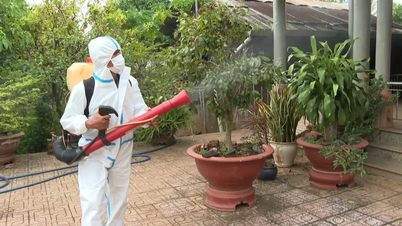

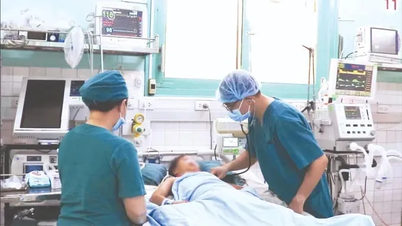
































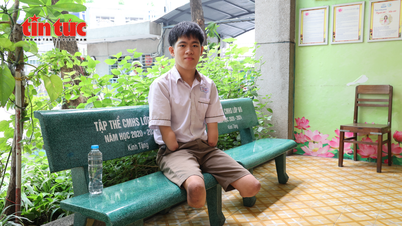




































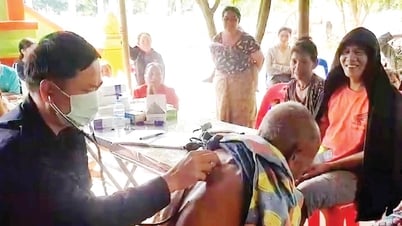

![[OCOP REVIEW] Bay Quyen sticky rice cake: A hometown specialty that has reached new heights thanks to its brand reputation](https://vphoto.vietnam.vn/thumb/402x226/vietnam/resource/IMAGE/2025/7/3/1a7e35c028bf46199ee1ec6b3ba0069e)




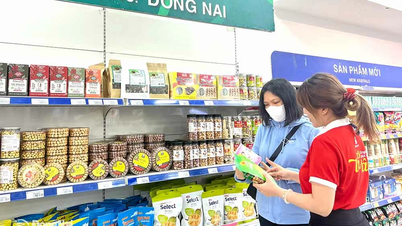








Comment (0)